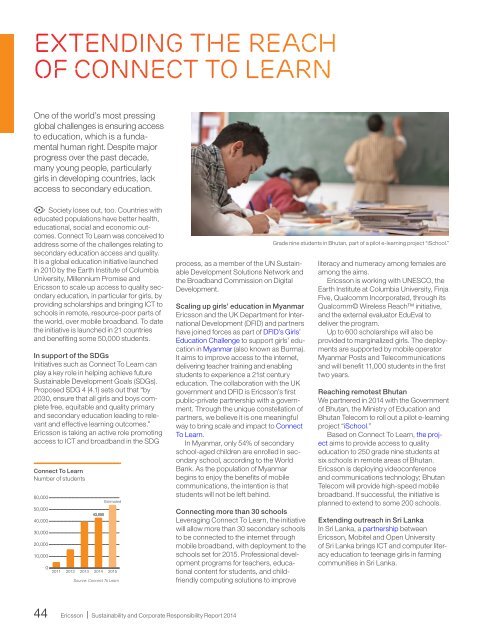OkCBP
OkCBP
OkCBP
You also want an ePaper? Increase the reach of your titles
YUMPU automatically turns print PDFs into web optimized ePapers that Google loves.
Extending the reach<br />
of Connect to Learn<br />
One of the world’s most pressing<br />
global challenges is ensuring access<br />
to education, which is a fundamental<br />
human right. Despite major<br />
progress over the past decade,<br />
many young people, particularly<br />
girls in developing countries, lack<br />
access to secondary education.<br />
Society loses out, too. Countries with<br />
educated populations have better health,<br />
educational, social and economic outcomes.<br />
Connect To Learn was conceived to<br />
address some of the challenges relating to<br />
secondary education access and quality.<br />
It is a global education initiative launched<br />
in 2010 by the Earth Institute of Columbia<br />
University, Millennium Promise and<br />
Ericsson to scale up access to quality secondary<br />
education, in particular for girls, by<br />
providing scholarships and bringing ICT to<br />
schools in remote, resource-poor parts of<br />
the world, over mobile broadband. To date<br />
the initiative is launched in 21 countries<br />
and benefiting some 50,000 students.<br />
In support of the SDGs<br />
Initiatives such as Connect To Learn can<br />
play a key role in helping achieve future<br />
Sustainable Development Goals (SDGs).<br />
Proposed SDG 4 (4.1) sets out that “by<br />
2030, ensure that all girls and boys complete<br />
free, equitable and quality primary<br />
and secondary education leading to relevant<br />
and effective learning outcomes.”<br />
Ericsson is taking an active role promoting<br />
access to ICT and broadband in the SDG<br />
Connect To Learn<br />
Number of students<br />
60,000<br />
50,000<br />
40,000<br />
30,000<br />
20,000<br />
10,000<br />
0<br />
2011<br />
2012<br />
2013<br />
43,050<br />
2014<br />
Estimated<br />
2015<br />
Source: Connect To Learn<br />
process, as a member of the UN Sustainable<br />
Development Solutions Network and<br />
the Broadband Commission on Digital<br />
Development.<br />
Scaling up girls’ education in Myanmar<br />
Ericsson and the UK Department for International<br />
Development (DFID) and partners<br />
have joined forces as part of DFID’s Girls’<br />
Education Challenge to support girls’ education<br />
in Myanmar (also known as Burma).<br />
It aims to improve access to the internet,<br />
delivering teacher training and enabling<br />
students to experience a 21st century<br />
education. The collaboration with the UK<br />
government and DFID is Ericsson’s first<br />
public-private partnership with a government.<br />
Through the unique constellation of<br />
partners, we believe it is one meaningful<br />
way to bring scale and impact to Connect<br />
To Learn.<br />
In Myanmar, only 54% of secondary<br />
school-aged children are enrolled in secondary<br />
school, according to the World<br />
Bank. As the population of Myanmar<br />
begins to enjoy the benefits of mobile<br />
communications, the intention is that<br />
students will not be left behind.<br />
Obs! Gjord med column<br />
design. Prata med<br />
Eva/Catta/Sanna Connecting om ev more than 30 schools<br />
frågor. Leveraging Connect To Learn, the initiative<br />
Gör så här: Färglägg will inte allow från more than 30 secondary schools<br />
paletten. Markera staplar to be med connected vita to the internet through<br />
pilen. Välj Object–Graph–Column.<br />
Där väljer man färg mobile och ev tint. broadband, with deployment to the<br />
Kolla särskilt att “Sliding” schools är valt på set for 2015. Professional development<br />
programs for teachers, educa-<br />
“Column type”.<br />
Type–Options: tional content for students, and childfriendly<br />
computing solutions to<br />
1 stapel: 76% 70%<br />
improve<br />
2 staplar: 80% 80%<br />
Grade nine students in Bhutan, part of a pilot e-learning project “iSchool.”<br />
literacy and numeracy among females are<br />
among the aims.<br />
Ericsson is working with UNESCO, the<br />
Earth Institute at Columbia University, Finja<br />
Five, Qualcomm Incorporated, through its<br />
Qualcomm© Wireless Reach initiative,<br />
and the external evaluator EduEval to<br />
deliver the program.<br />
Up to 600 scholarships will also be<br />
provided to marginalized girls. The deployments<br />
are supported by mobile operator<br />
Myanmar Posts and Telecommunications<br />
and will benefit 11,000 students in the first<br />
two years.<br />
Reaching remotest Bhutan<br />
We partnered in 2014 with the Government<br />
of Bhutan, the Ministry of Education and<br />
Bhutan Telecom to roll out a pilot e-learning<br />
project “iSchool.”<br />
Based on Connect To Learn, the project<br />
aims to provide access to quality<br />
education to 250 grade nine students at<br />
six schools in remote areas of Bhutan.<br />
Ericsson is deploying videoconference<br />
and commu nications technology; Bhutan<br />
Telecom will provide high-speed mobile<br />
broadband. If successful, the initiative is<br />
planned to extend to some 200 schools.<br />
Extending outreach in Sri Lanka<br />
In Sri Lanka, a partnership between<br />
Ericsson, Mobitel and Open University<br />
of Sri Lanka brings ICT and computer literacy<br />
education to teenage girls in farming<br />
communities in Sri Lanka.<br />
44 Ericsson | Sustainability and Corporate Responsibility Report 2014


